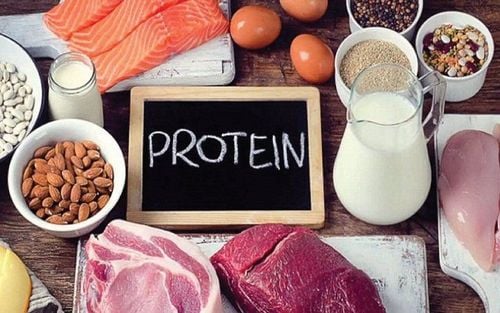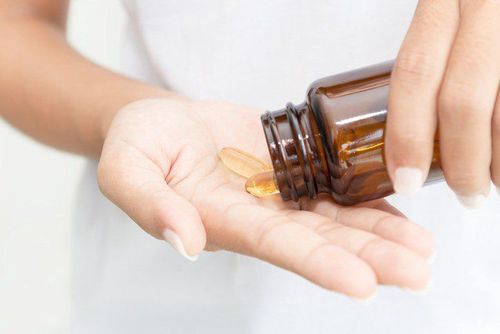This is an automatically translated article.
Collagen is a protein that the body makes naturally and it makes up about 1/3 of the protein in the body. Collagen is essential for joints to stay healthy and to keep skin elastic to reduce wrinkles.
1. What you need to know about collagen
What does collagen do for your body? The word collagen comes from the Greek word "kólla", which means glue. Collagen's fibers act like glue to hold everything together in your body: muscles, bones, tendons, ligaments, organs and skin.
Types of Collagen There are 16 important proteins in your body. But most are type I, II or III. Each type has a different job. Type I builds skin, bones, tendons, and ligaments. Type II helps make cartilage, the flexible tissue between your bones, in your ears and nose. Type III helps build muscles and blood vessels.
Collagen as you age As you age, your body makes less collagen. You can't measure exactly how much collagen you have in your body, but as collagen decreases, you may experience symptoms such as joint pain or stiffness in tendons or ligaments; Muscles can weaken and skin wrinkle. Collagen supplements may help alleviate these symptoms. However, you need to consult your doctor about appropriate use and dosage.
2. What Affects Your Collagen Levels?

Ánh nắng mặt trời có thể làm tổn thương da,giảm mức collagen
Besides the time factor, three main things that will decrease your collagen levels are: sunlight, smoking and sugar. Overexposure to ultraviolet rays causes the fibers of collagen to shed.
This can lead to sun damage, such as wrinkles. Many of the chemicals in cigarette smoke can damage collagen and cause skin to sag and wrinkle. Sugar causes collagen's connective fibers to overlap and tangle. This makes your skin less elastic over time.
3. What Can Collagen Treatments Do?
Some cosmetic surgery procedures use collagen injections to plump the skin, such as lip injections or scar treatment. These injections can help your body make more collagen.
You may need to have the procedure again every few months to a year for the therapy to work for long. Some research shows that collagen supplements can improve skin elasticity, reduce dryness, and increase collagen density. In addition, these products can also reduce joint pain and make you more active.
4. Collagen can not do?

Collagen không thể điều trị tình trạng viêm da dị ứng
There is no evidence that collagen treats skin conditions such as eczema or atopic dermatitis. While collagen injections can help treat acne scars, there's no evidence that collagen supplements can prevent or treat acne. And there are no studies that show collagen helps with weight loss.
5. Is collagen cream effective?
Lotions with synthetic collagen may not be an effective way to increase this protein in your body. When applied to the skin, these products create a protective barrier on your skin and prevent water loss, but they do not increase the amount of collagen in your skin.
This product is good at protecting your skin from the sun, especially when you are young and the skin may be more sensitive.
6. Foods to increase collagen in the body

Thực phẩm chứa các chất dinh dưỡng như vitamin C, kẽm và đồng giúp tăng lượng collagen trong cơ thể
You can help your body make more collagen by eating healthy foods. To make collagen, your body combines amino acids called glycine and proline. You'll find these amino acids in protein-rich foods like chicken, fish, beef, eggs, dairy, and beans.
Other nutrients, like vitamin C, zinc and copper, also play a part in collagen production. You can get vitamin C in citrus fruits, tomatoes, and green vegetables. For zinc and copper, try shellfish, nuts, whole grains, and beans.
7. Bone Broth and Collagen
Some good sources for proteins that help build collagen are foods like red meat, chicken, and bone broth. To make bone broth, boil animal bones in water for 1-2 days. This draws some of the collagen protein into the broth.
Your body does not absorb it right into the skin or joints. The body breaks down protein into amino acids to help build tissue. You can buy bone broth in grocery stores or make your own.
8. Do you need a collagen supplement?
If you eat a balanced diet, your body can make enough collagen for your needs. Most of the research on collagen supplements takes place on a small scale.
We need more large studies to understand the health effects of collagen supplements. But if you want to give it a try, the manufacturers claim that this is a safe product with no side effects. These products usually come in powder form and you can mix them into drinks or sauces.
9. Are Collagen Supplements Regulated?

Uống collagen
The Food and Drug Administration does not regulate collagen supplements, so companies that make collagen products do not have to prove they are effective or safe.
If you buy collagen products, look for these keywords in the product's ingredients: collagen hydrolysate, hydrolyzed collagen or collagen peptides.
10. Prevents collagen loss
Laser therapy can help treat stretch marks, as it can stimulate the growth of collagen, elastin and melanin.
A healthy diet can help the body produce collagen. Nutrients that may support collagen formation include:
Proline: In egg whites, meat, cheese, soy and cabbage. Anthocyanidins: In blackberries, blueberries, cherries, and red raspberries. Vitamin C: In oranges, strawberries, peppers and broccoli. Copper: In shellfish, nuts, red meat. Vitamin A: Appears in foods of animal origin and in plant foods as beta-carotene. Customers can directly go to Vinmec health system nationwide to visit or contact the hotline here for support.













